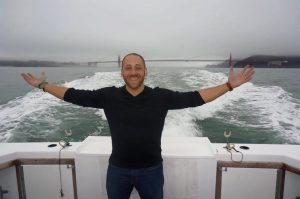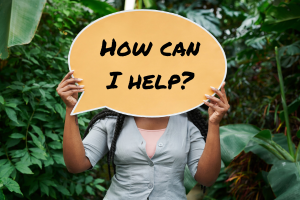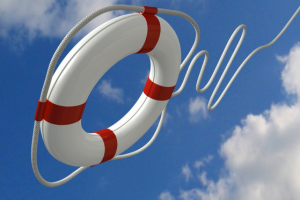After My Suicide Attempt, I Made This Plan to Stay Alive and Well
 Trigger warning
Trigger warning
A single, circular, black and white-colored analog clock adorned the off-white wall. Groggy, my eyes strained then refocused. It was 4 a.m. I had been in limbo overnight waiting for an in-demand, overbooked, cheap wood-framed, rather uncomfortable single bed. It was an early, solemn San Francisco morning: May 1st, 2004. I was 23 years young. My father and I had been in the filthy sock-smelling emergency room overnight.
It wasn’t our first time in this predicament. He waited anxiously near the door of my linoleum-floored, white-walled room. It was the third floor of the locked down unit within the St. Francis Hospital Psychiatric Ward. We had been here before, three times in fact. So often that when a moment of levity passed, I referred to it as my exotic hotel stay. Time and again, I had to live in place like these — to equalize, to heal, and to regain a semblance of sanity. You did not misread the title. I was in my third psychiatric hospital stay. I would see the inside of a place like this four more times over the course of the next 7 years. Why? Well the answer is not as simple as “I lost my mind.” or “I just went nuts.” No, those self-berating descriptions are vague and quite frankly offensive to someone who has suffered mentally like I have, and like I do. The answer is much more complex and quite detailed.
Most have never regained full mobility. I have been blessed to regain all mobility and maintain my physical fitness. Others have stayed in silence, keeping their stories to themselves. Many have simply gone on with their lives, and eventually pass on of natural causes. Some have opened up, begun speaking about their experiences, sharing with the public what they can about the perils of suicidal ideation, great suffering and pain. These stories of triumph over adversity are not just important for readers, and followers of the mental health movement (An absolute civil rights movement of this or any time) but imperative for so many people’s continued survival. In the drab, smelly hospital, focusing — not only on the health of my brain, body, my metaphorical heart, and searching of the soul — became key.
The idea of achieving total physical, mental, emotional, and spiritual health is what got me through from one day to the next. Morphing from the self-loathing, inner critical thinking creature I had become would not be easy. Soon, I came to the realization that it was entirely possible, maybe even plausible. It would be the most likely outcome. However, this alternate positive and potential reality would only be reachable with a tremendous amount of therapeutic dedication and most of all an unhindered intense drive. The kind of drive that needed to be enacted upon minute by taxing minute in order for me to survive and thrive.
I learned to utilize the kind goal setting devices needed to build the solid support of a group of personal protectors meant to guide me in times of episodic crisis. This was a group of loved ones, family, and friends who I would request to opt in to my ‘Let’s Keep Kevin Alive’ plan. It is a quick guide to hope and healing, architecturally designed to fit my needs. It was something concrete that could keep me going in rough times, and keep me alive when all I can do is ponder, and plan my death by suicide.
Ten Steps:
1. Therapy. I will use anything that works, from cognitive behavioral, breathing, art, music, to blue wave light box therapies. All of which help me either stay stable or find a balance.
2. Sleep. Redeveloping a good to great circadian rhythm, a sleeping pattern that allows me at least five nights of 7-8 hours of sleep out of a seven day week. This gives me the rejuvenation my brain needs to function on its highest, and safest level. Lack of adequate rest, and sleep, can lead to insomnia (where I was), and insomnia leads to psychosis. Adding that to bipolar disorder type one with psychotic features is just dangerous.
3. Education. This would be the education of my diagnosable mental illness, and the study of the various and most up to date, reputable, proven treatments available. Constantly reading about my struggle, and subsequent learning how to address the disease, fight it and continually beat the symptoms as they come, would allow me to be my better self; a well-rounded, and happier self.
4. Exercise. My motto: if you are physically capable of exercise, it is simple, move that body. Do the deed not for vanity, but to increase levels of sanity. It has been proven that rigorous activity, and exercise for 23 minutes a day, leads to 12 hours of better, or improved mood. I often do 23 minutes of rigorous non stop workouts twice a day, leading to 24 hours of better mood. This one really helps not just you, but everyone near you. It is important to acknowledge how each and every action affects everyone else around us. We are not alone and when we hurt, the people who love us are in pain as well.
5. Meditation. Practicing regular daily meditation and focused breathing methods can help the body recuperate from mild, modern and immense stress. This gives us the ability to keep on keepin’ on. Meditation has been proven to help people calm, and quiet their minds, bodies and look inside for peace and tranquility. It helps me in a panicked state, create serenity internally, and externally. These two qualities can be achieved with different forms of proven meditation are key factors to staying calm, cool, and collected. As the ubiquitous they always says a cool head always prevails.
6. Medication. This one is mainly for those with diagnosed mental health, and behavioral health conditions. Personally, I take medications every day, around the same time a day. I take them with 100 percent accuracy each day, because I understand they help me stabilize and keep off the crooked path. Truth be told, they don’t help everyone. Over the years, I have managed my BPD best with them. My suggestion, having lived now almost 18 years with a severe diagnosable mental illness, is if you have been prescribed meds, be compliant enough to take them properly. Do not skip doses, at the same or nearly the same time daily, and never while on illegal, or drug substances including alcohol. Try never to take them with a foreign substance in your system, as they will most likely counter-act with one another. This can prove very dangerous, and debilitating to you and your well-being.
7. Absolutely refrain from drugs and alcohol. I used to binge drink until blackout while on psychotropic medications. This is something that could have ended in an early death or even damage to parts of my brain. I never have used any other drug other than alcohol. My biological parents had the co-occurring diseases of manic depression (today bipolar disorder) and the serious disease of addiction. They both died horrible, and tragic deaths because of these factors. For that reason, recreational illicit drugs have always been off the table in my book. If you battle the disease of addiction, I hope this helps you consider seeking professional help to change your lifestyle, and find tools to help retrain your brain to live without such self-destructiveness.
8. Healthy eating, and a clean living lifestyle. Eating foods that directly feed the brain with good nutrition, will help you stabilize your overall health. Learning what foods help you personally is paramount. Eating healthily and routinely can help to keep your body and mind at an equilibrium. Not only does this benefit you, but by sheer example it gives you the ability to inspire others around you to make these kinds of good health choices. It helps you use this guide to have great health, not just good health. Life with less toxins and processed foods can help any body and mind heal and recover faster, as well as live longer. If it comes in a box, wrapping, or plastic packaging, it’s probably not the best choice. I will freely admit that I love, love, love Taco Bell. Even so, I no longer eat it. It only made me feel sick, and fast food tends to have that effect because it is not “real” food.
9. Coping mechanisms. Hobbies, tools, and helpful activities that help you stay grounded when fighting a brain disease. I walk in nature, sketch on sketch pads, read comic books, watch newly-released movies, go on date nights with my wife, exercise for fun, and read a lot. All of these activities are my way of coping with my mental battles. When I hallucinate (which I do often enough), I ground myself with one of my coping mechanisms. I grasp my hands left to right, back and forth when I am self aware enough to know that what I am seeing or hearing may not exist in anyone else’s reality. Simultaneously, I ask the person nearest to me if they hear or see the perceived hallucination. Those closest to me do not invalidate my reality, they acknowledge that it is real to me, but that they are not experiencing the same things. Over time, with the coping and grounding exercises, I get past the distorted reality and eventually come back to our true reality.
10. The Plan. I created my very own mental and brain health emergency plan. The emergency plan has all of my doctors’ and clinicians’ names, phone numbers, email addresses, physical addresses. It also includes descriptions of my symptoms, signs, episode triggers, and more. It contains copies of release forms signed by my personal protectors. These are people who I have I opted in to my plan so that if any one of them wanted to call any one of my doctors at any time to discuss my treatment plan and/or symptoms, they have authority to speak with my doctor(s). They would be able to get a play by play, usurping HIPA laws, and giving those closest to me the ability to be a part of my change, and safety efforts at any given day. Why? The answer is simple, no one with a mental illness, a brain disease, or behavioral health battle can do this alone, and everyone needs help sometime.
So there it is. This is how I fight to stay all kinds of well. This is how I strive to live with my best brain ever.










Seems like a great article but as I’m feeling depressed at the moment I’m unable to concentrate on the lengthy article…
… much less engage with it. At what point does this “ten-step recovery” become less trouble than it’s worth? A leap of faith perhaps?
“The idea of achieving total physical, mental, emotional, and spiritual health is what got me through from one day to the next. Morphing from the self-loathing, inner critical thinking creature I had become would not be easy. Soon, I came to the realization that it was entirely possible, maybe even plausible. It would be the most likely outcome. However, this alternate positive and potential reality would only be reachable with a tremendous amount of therapeutic dedication and most of all an unhindered intense drive.”
Thank you, Kevin, for your courage and passion heal not only yourself and lived one’s, but sharing your life and survival to help others heal. At the very least, you are a miracle and we’re saved as your purpose is clear, though at times it may seem blurred for you, I assure you, you touch lives beyond your reach. Strange how powerful media is…watched a Bonanza episode, referenced how Incas engineered bridges, led me to tge Smithsonian Institute to PBS to Nova to Psych Alive to discover you and your miraculous life and ever changing experience. You are an amazing writer as I held my breath though each and every painstaking word. Our world is blessed to have you, I am blessed to have learned from you and I will share with those I know currently suffering with brain disease and keep your information for future reference. Definitely want to read your memoir. God Bless YOU! BIG HUGS AND JOYFUL BLESSINGS, jill